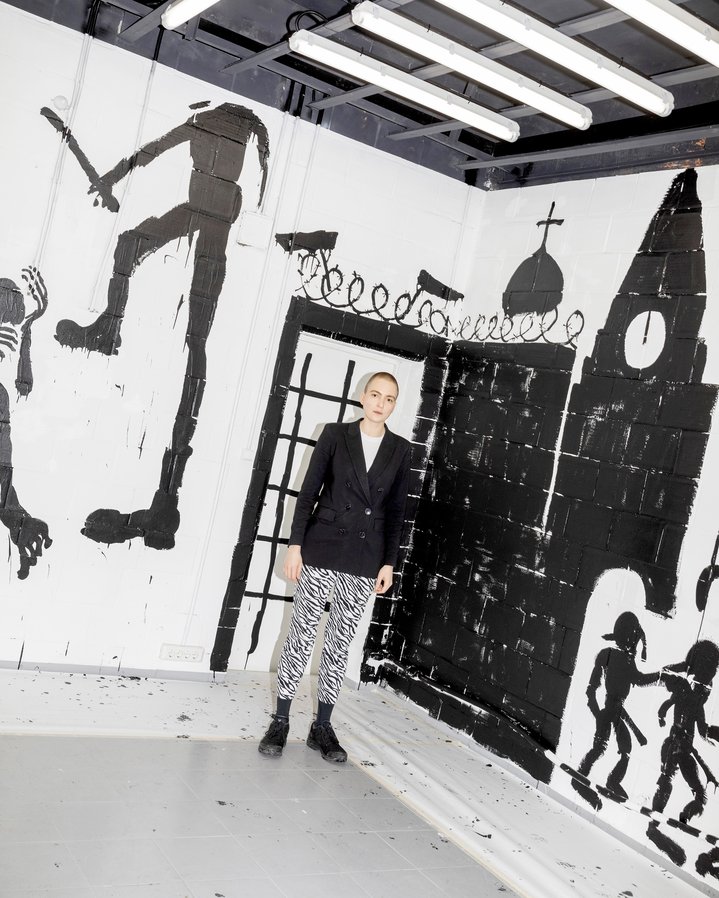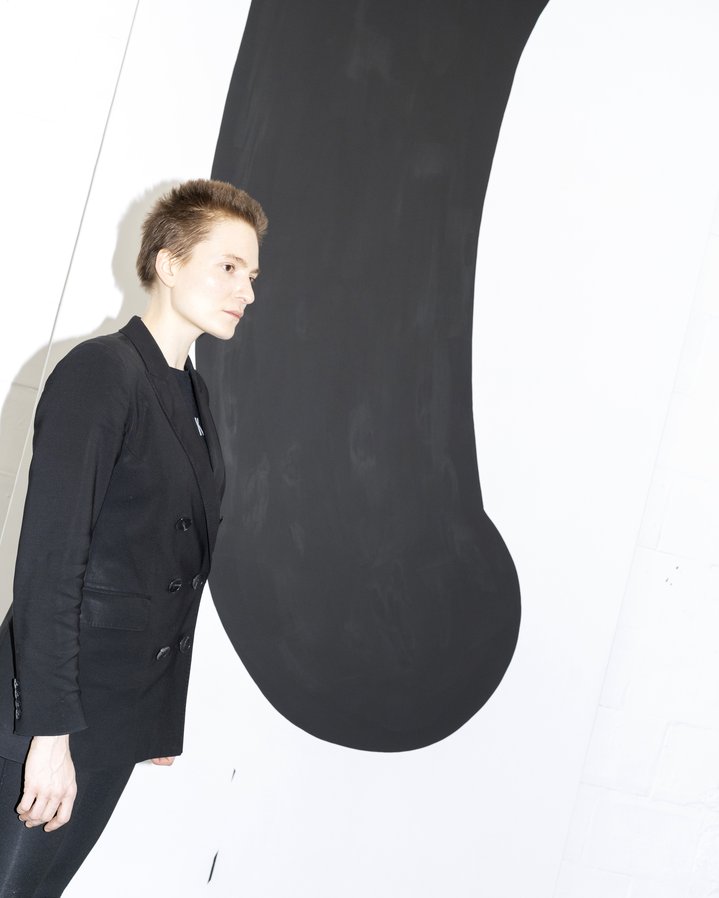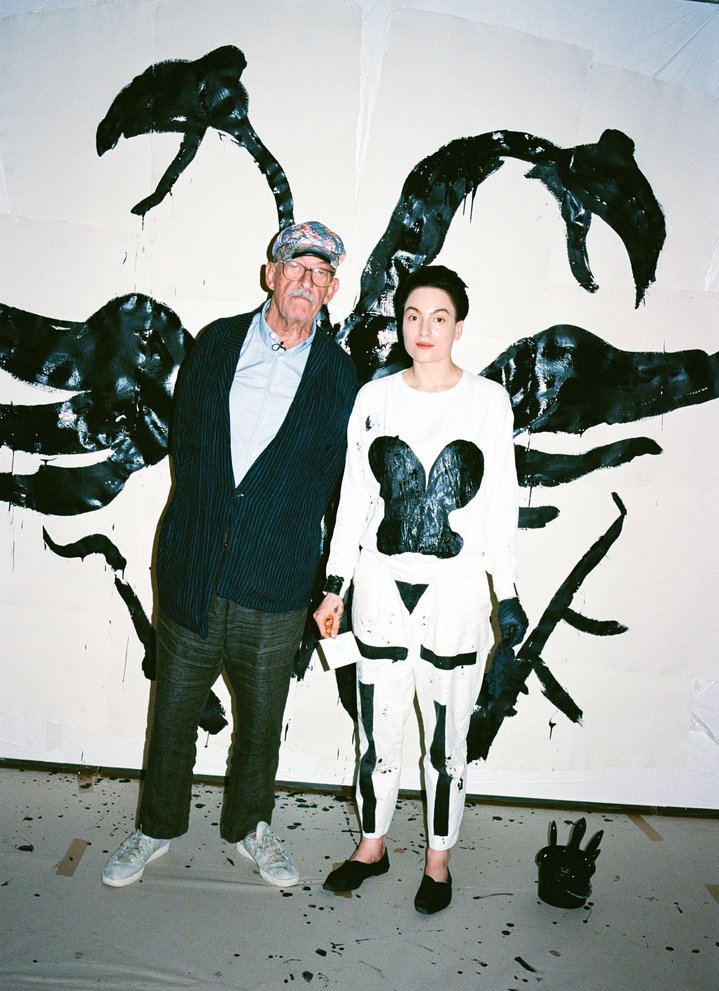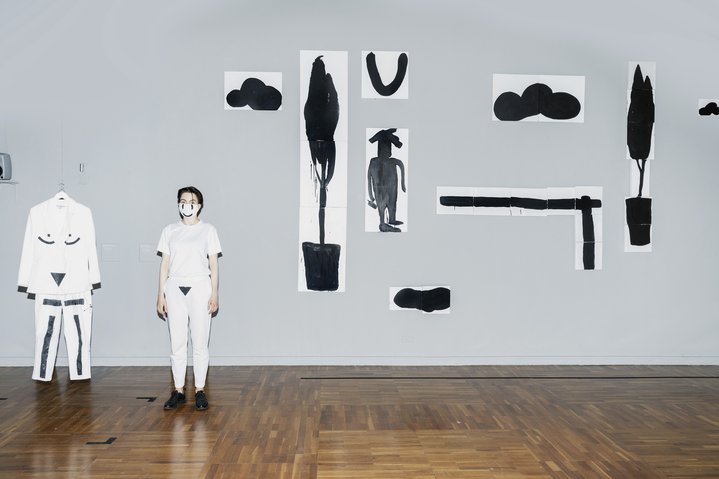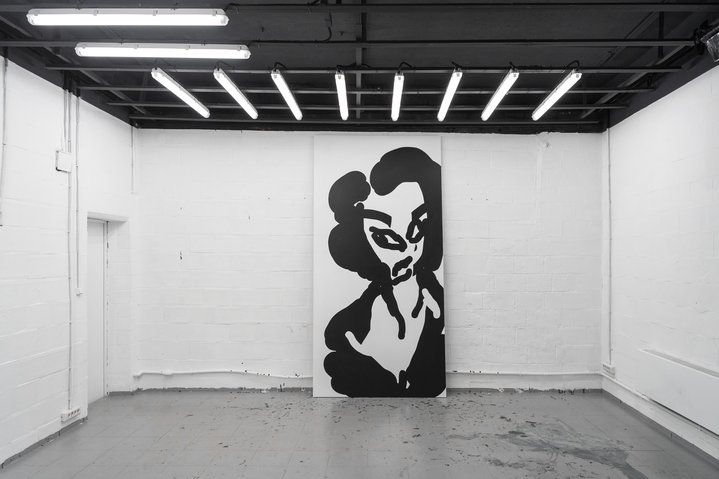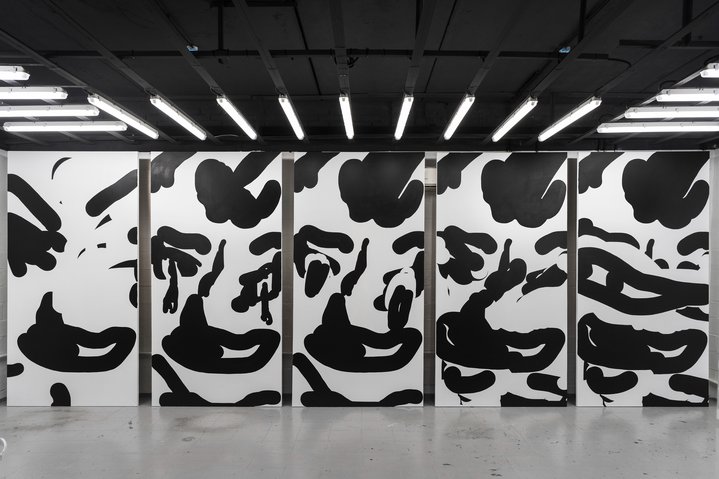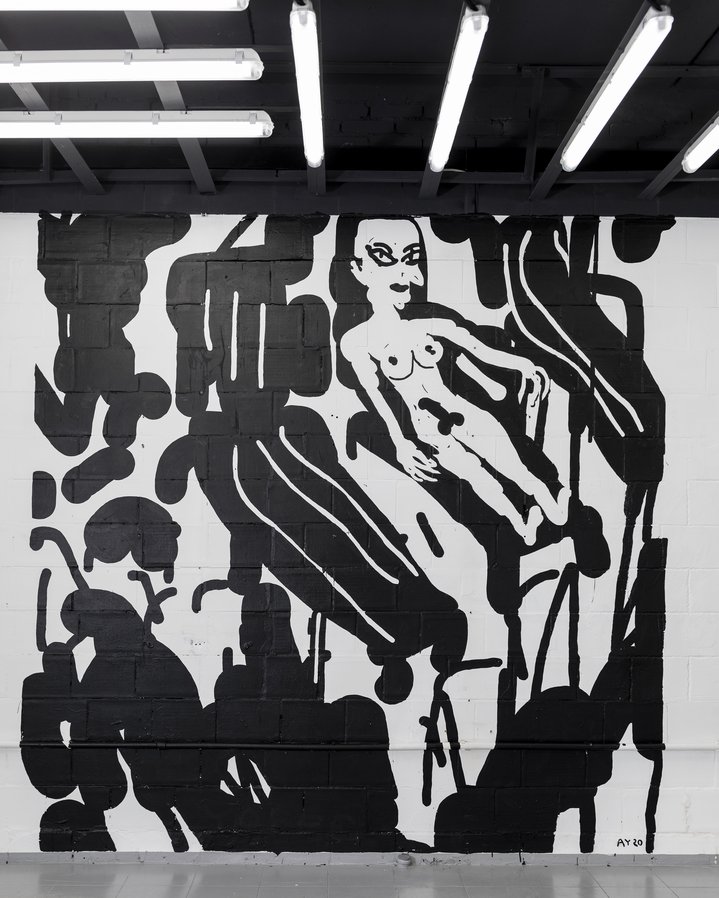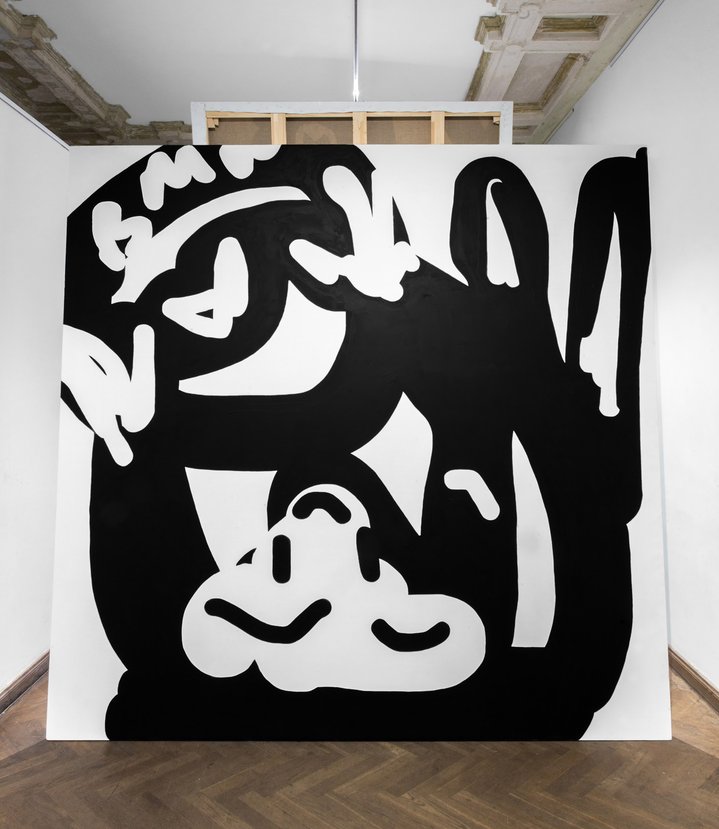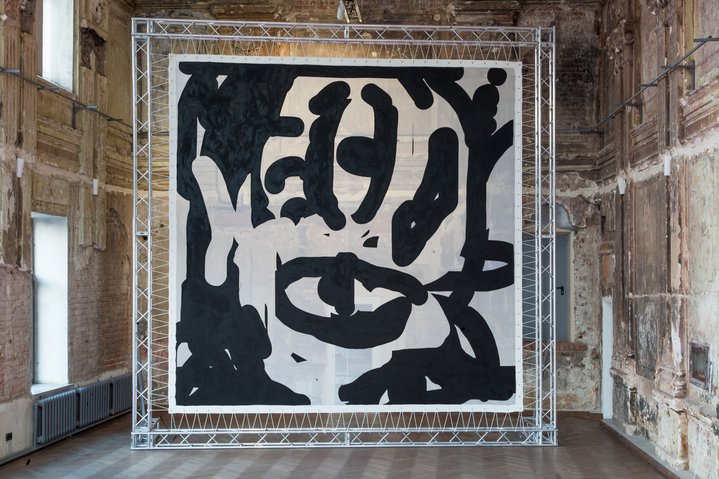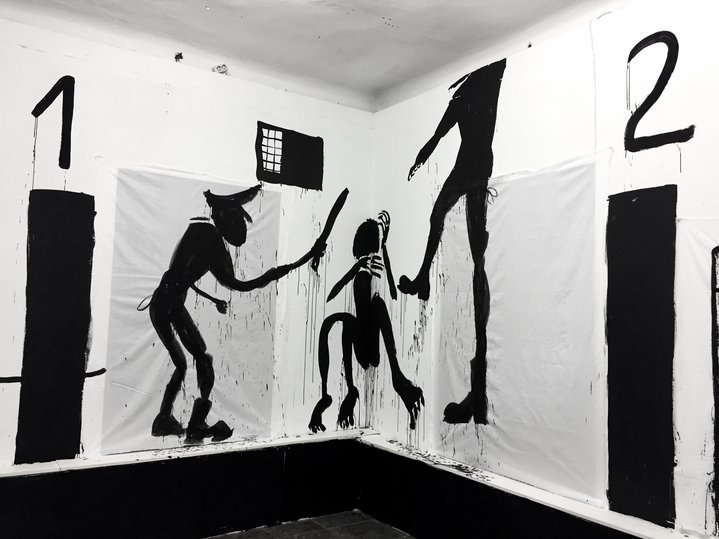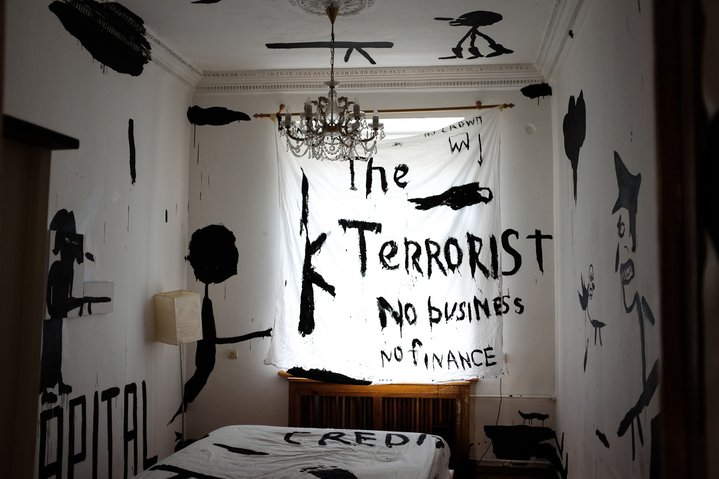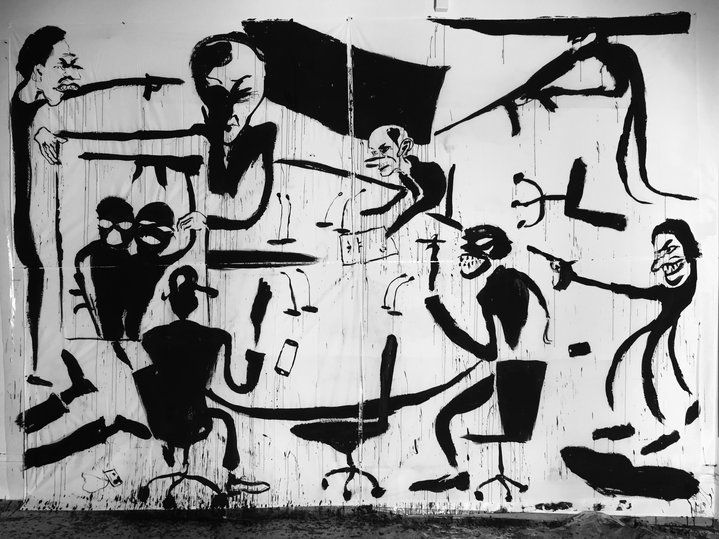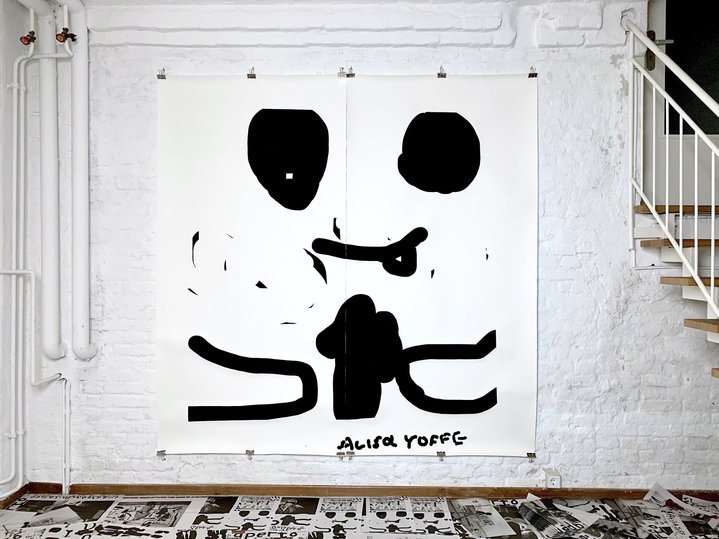Painterly punk Alisa Yoffe

A young Russian artist, who eschews all colours but black and white and easily transfers her minimalist sketches from a small iPhone screen to enormous canvases, is opening a solo show in Moscow.
The image of a pale and androgynous young woman, with a shock of black hair standing in a crisp white suit painted with just a few marks of black paint to indicate the nude female body – nipples, breasts and a triangle for pubic hair – this is the artist’s most popular image, the calling card of Alisa Yoffe (b. 1987). The work, this painted suit, now part of the Tretyakov Gallery permanent collection, ‘Suprematic Nude’ (2019) is emblematic for the artist – it encapsulates her desire to bring painting out of the two-dimensional realm into the real world, where the interaction with it is physical and all-encompassing and, yet, achieving this through the most minimal means, here evident in the nod to suprematism; the suit foregrounds her persona, which seems an integral part of her work, in this case so much so that she has become her own canvas; it points to the superficiality of gender and unpacks the idea of the female nude, nudity and clothing.
Touching on the world of clothes and fashion, this is the unlikely place where Yoffe’s artistic journey began. She quit her studies in a clothing design college after she came across a book on contemporary art at age fifteen – she realised this strange and confusing world was where here true calling lay. She sought out open lectures and courses in Moscow (where she’d moved to from Tashkent, Uzbekistan) that she could attend having no prior qualifications or education and eventually joined the circle of Anatoly Osmolovsky (b. 1969) – cult radical artist and educator. It was Osmolovsky who saw her potential in drawing and painting, encouraging her to pursue this avenue rather than the popular conceptual vein of contemporary art. Once, when Yoffe ran out of coloured paint, she realised that black was quite enough and did the job she wanted, this really set off her now trademark style of huge monochrome paintings.
Her earlier works focus on caustic social commentary on topics, such as police violence or documentations of a punk underground scene. On huge rolls of paper, fabric or directly on walls. She eventually began to sketch increasingly on her iPhone, which allowed her to never stop drawing. She projects select sketches onto large canvases and transfers the enlarged drawings with paint – opening up the dialogue between digital and analogue. For example, a series of paintings show the progression of one sketch through five phases, thus monumentalising a seemingly ephemeral transition. Another work is a hugely enlarged digital drawing of one finger stroke, taking on the shape reminiscent of a penis and below it several flecks of accidentally un-erased digital paint, meticulously transferred onto the canvas – look at once like suprematist geometrical shapes, drips of paint or sperm. But these allusions are too thin and ostensibly the works are abstract. This is Yoffe’s most recent project, ‘Chance’, to open soon in Moscow’s Fabrika art centre (December 9 – January 12).
But the turn to abstraction is partly a compromise in the current climate of heightened censorship: “The social nerve in me is really inflamed, so I’d love to just rip it out and do something free from social inequalities, especially at a time when these things are so painfully visible,” says Yoffe with earnest regret. “It’s a problem, but these parasites infest your consciousness. So, when I draw these more abstract elements, I think – I can’t justify that! Look what’s going on around me, how can I keep silent? But maybe there’s more potential for freedom in this than repeating the same thing that’s all over the news. That’s why I’m keeping the social statements to my studio walls.”
In her studio, Yoffe feels in her element. She spends most of her time there, returning only to sleep in the hotel where she lives. She has no family, nor relationships, she got rid of all her bad habits, she says, she realised in 2018 that these things stood in the way of her true calling. Now, she spends all her time and money on her art, drawing and painting. “I don’t need to force myself, it’s part of my consciousness, I want to, I need to, I have little time, life is short.” At her age, this seems an unexpected realisation, but she has huge plans, she’d love to buy a hangar or an army base and turn it into a museum, her ambition is to make paintings of a huge, architectural scale and intention.
Does she imagine an audience? Not initially. She says she can’t rely on the opinions of outsiders, or if so, only inversely: “I often get told: its aggressive, scary, we don’t like it, it’s too big. But, I think if people don’t like it that means there’s something there, I need to make more of that, cool, that stimulates me.” And this strategy has paid off. Forbes listed her among the most perspective young Russian artists of 2015, last year she came 4th of the top 50 up-and-coming artists according to The Art Newspaper Russia. She is a favourite for collaborations with global brands such as Cartier, Comme des Garçons, Maison Margiela and Bonne Suits. She has exhibited internationally with group and solo shows and at biennales. And, she notes with particular pride, artists like to collect her works.
Alisa Yoffe. Chance
Fabrika Centre for Creative Industries
Moscow, Russia
December 9, 2021 – January 12, 2022






